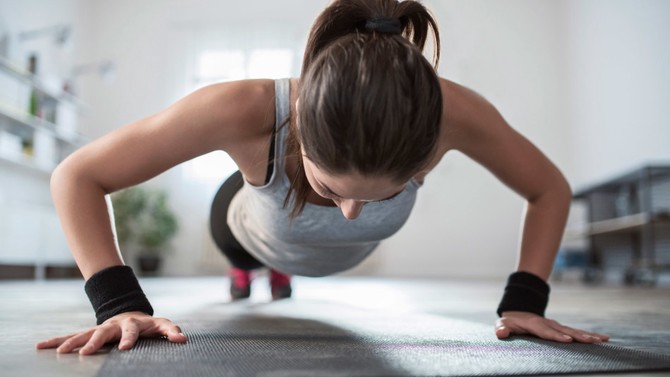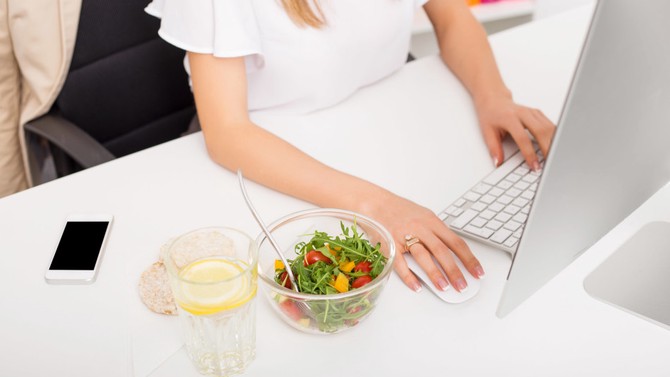8 Morning Rituals That Help You Lose Weight
Simple ways to reach your goals right from the moment you wake up.
By Emma Haak

Photo: kirin_photo/istockphoto
Add this to your breakfast
Lean protein curbs unnecessary noshing by helping you feel fuller and builds lean muscle that burns calories even when you're not exercising, says Marina Chaparro, MPH, RDN, a spokesperson for the Academy of Nutrition and Dietetics. Most of us meet our daily protein requirements, but we're not always getting it from lean sources such as fish, chicken, turkey and vegetarian sources like beans and legumes. Instead, we're picking red meat and cheeses.
What to do about it? Focus on lean proteins and aim to eat about 1 gram of protein per day for every 2.2 pounds you weigh, says Chaparro. (A 145-pound woman would need roughly 66 grams.)

Photo: knape/istockphoto
But don't add that to your first meal of the day
You know that bingeing on Veep to the point that you don't realize how much food you're eating is a problem but there's another issue with watching TV during a meal: being able to hear the noises your food makes while you eat it may help you consume less, suggests a small study in Food Quality and Preference. The researchers behind the findings have dubbed it the "crunch effect," reporting that subjects ate fewer pretzels while wearing headphones playing quiet noise versus those playing loud noise. (The effect is strong enough that the mere suggestion of chewing noises was enough to make subjects eat less.)

Photo: LeoPatrizi/istockphoto
Do something to try to affect your cortisol level
Why? Because stress increases cortisol levels, and cortisol likes to store weight in your stomach, says Michael Jensen, MD, an endocrinologist and obesity expert at the Mayo Clinic in Minnesota. (Researchers aren't sure why.) It could also slow down your metabolism. When stressed and non-stressed women ate the same high-fat meal, the harried ones burned fewer calories at rest afterward, found a study in Biological Psychiatry.
We're not recommending revamping your life just for a slim stomach—these tips are good for your overall well-being, too. In a pinch, try one of these seven ways to de-stress in under an hour.

Photo: SrdjanPav/istockphoto
Exercise—but not the same way every day
Studies that pit cardio against strength training have come to conflicting conclusions, with some saying time in the cardio area is more important than time in the weight room and vice versa. But a combination of the two gets rid of the most belly fat, found a large review of the research.
Build a fitness routine around both, and make sure it includes a couple of high-intensity interval (HIIT) sessions per week—research shows that HIIT is particularly effective at melting belly fat. Running is a great HIIT option, but high intensity doesn't have to mean high impact. You can do an effective HIIT workout on more joint-friendly machines like the elliptical, stationary bike or rower. (If you do want to do your intervals on the treadmill, though, we've got a trick for that).

Photo: Squaredpixels/istockphoto
Start a list of these things
Women who jotted down their values (from religion to relationships to politics) then wrote about the one that was most important to them lost more weight, and had smaller waist circumferences and lower BMIs four months later than women who were also trying to downsize but didn't spend time focusing on their values, found one study. The study authors speculate that thinking about what matters to us may help us feel more in control of our habits and better about ourselves overall, making it less likely that we'll reach for food when we need an emotional pick-me-up.

Photo: Geber86/istockphoto
Find a community of straight talkers
Weight loss is hard, and support will make it easier. Family and friends can be great people to lean on, says Jennifer McDaniel, RDN, a spokesperson for the Academy of Nutrition and Dietetics, but watch out for those who aren't really looking out for you (like the friend who's always encouraging you to "have just one more" of everything). The best bet may be to reach out to people who are also trying to lose weight. Bartolome Burguera, MD, leads weight-loss groups at the Cleveland Clinic and notes that "the success that happens here isn't because of the doctors, it's because of the support that the group provides" and that patients are always sharing honest advice about what's worked for them and what hasn't.
Find a community of people with whom you can share your weight-loss journey. Lots of food-tracking and weight-loss apps include ways to connect with other users, or ask your doctor if their office ever organizes get-togethers for patients trying to lose weight.

Photo: grinvalds/istockphoto
Think about lunch at least this long before lunchtime
Since virtually no one makes good choices when they're famished, set an alarm one hour ahead of your break. According to recent research in the Journal of Marketing Research, when people placed their lunch orders at least 60 minutes before it was time to eat, they consistently ordered less caloric meals. (Of course, the smartest choice is to bring your own lunch—because if you brought leftover whole wheat pasta, that's what you're having.)

Photo: vgajic/istockphoto
Make this your mantra
"Extraordinary results don't require extraordinary actions—they require ordinary actions done daily." That's the motto Lee Jordan, American Council on Exercise-certified personal trainer and health coach who specializes in helping people with considerable extra weight, shares with all of his clients. "The first mistake people make when they start trying to lose a lot of weight is thinking, 'I have this huge amount of weight to lose, so I have to push myself to the limits to do it,'" he says.
Want more stories like this delivered to your inbox? Sign up for the Oprah.com Healthy Body Newsletter!
Published 02/23/2016

